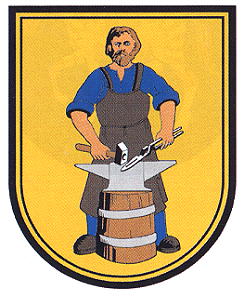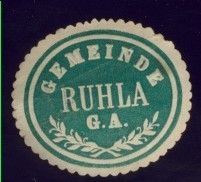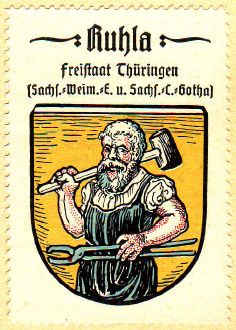Ruhla: Difference between revisions
Jump to navigation
Jump to search
Knorrepoes (talk | contribs) No edit summary |
Knorrepoes (talk | contribs) m (Text replace - "[[Literature" to "{{media}} [[Literature") |
||
| Line 20: | Line 20: | ||
|align="center"|[[File:ruhla.hagd.jpg|center]] <br/>The arms in the [[Kaffee Hag albums]] +/- 1925 | |align="center"|[[File:ruhla.hagd.jpg|center]] <br/>The arms in the [[Kaffee Hag albums]] +/- 1925 | ||
|} | |} | ||
{{media}} | |||
[[Literature]] : Hupp, O: [[Kaffee Hag albums]], 1920s; Benzing et al, 1984; Ulle, 1998 | [[Literature]] : Hupp, O: [[Kaffee Hag albums]], 1920s; Benzing et al, 1984; Ulle, 1998 | ||
Revision as of 04:44, 9 July 2014
| Heraldry of the World Civic heraldry of Germany - Deutsche Wappen (Gemeindewappen/Kreiswappen) |
RUHLA
State : Thüringen
District (Kreis) : Wartburgkreis
Additions : 1994 Kittelsthal, Thal
Origin/meaning
Ruhla was divided in 1640 between Sachsen-Weimar and Sachsen-Gotha. The Sachsen-Weimer part received city rights in 1896 and used as arms a rising sunflower. The Sachsen-Gotha used in its seals a smith, taken from a local legend. When on November 30, 1927 the two cities were again united the common seal showed a smith, but without anvil. The present arms were designed in the middle of the 20th century.
| Seal from around 1900 |
The arms in the Kaffee Hag albums +/- 1925 |
Contact and Support
Partners:
Your logo here ?
Contact us
© since 1995, Heraldry of the World, Ralf Hartemink 
Index of the site
Literature : Hupp, O: Kaffee Hag albums, 1920s; Benzing et al, 1984; Ulle, 1998













